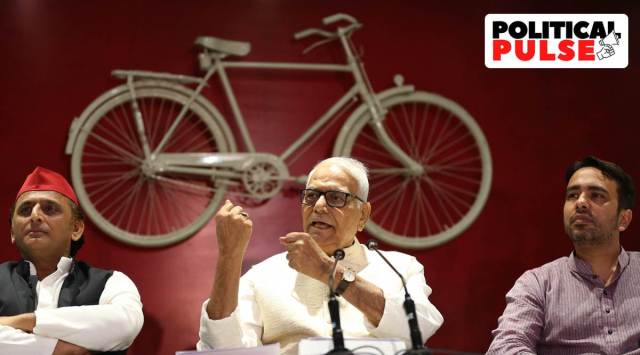Presidential poll: TMC watchful about tribal votes, Yashwant Sinha may skip Bengal during campaign tour
Opposition nominee’s camp cites ‘paucity of time’, says ‘one should not read too much into it’
 Yashwant Sinha with Samajwadi Party leader Akhilesh Yadav and RLD chief Jayant Chaudhary in Lucknow, Thursday. Sinha said that if elected President, he would remain accountable only to the Constitution and would stop the government from violating principles of democracy. Vishal Srivastav
Yashwant Sinha with Samajwadi Party leader Akhilesh Yadav and RLD chief Jayant Chaudhary in Lucknow, Thursday. Sinha said that if elected President, he would remain accountable only to the Constitution and would stop the government from violating principles of democracy. Vishal SrivastavTrinamool Congress (TMC)-governed West Bengal is not likely to feature in the travel itinerary of joint Opposition nominee for presidential elections Yashwant Sinha, who plans to visit, among other places, Chandigarh, Jharkhand, and Bihar ahead of the polls on July 18.
While there was no official comment from the TMC about Sinha not visiting Bengal, sources in the former Union minister’s campaign team indicated that he might skip Bengal “due to paucity of time”.
“One should not read too much into it. He has to visit many other states and there is very little time. In the case of West Bengal, the majority of votes are assured in his favour in any case,” the functionary said. A TMC leader also stressed that Banerjee had directed every MLA and MP to vote for Sinha.
Sinha was a senior office-bearer of the TMC before stepping down on June 21 to accept the Opposition’s candidature. The TMC had taken the lead in forging consensus in the Opposition bloc about fielding a joint candidate. But with the BJP-led National Democratic Alliance (NDA) fielding former Jharkhand Governor Droupadi Murmu, who belongs to the Adivasi community, the TMC has been maintaining a strategic distance from Sinha’s campaign.
Last Friday, West Bengal Chief Minister and TMC chairperson Mamata Banerjee told reporters that Murmu could have been the consensus candidate of all parties had the BJP been forthcoming about its choice. West Bengal has a sizable Santhal Adivasi community to which the former Jharkhand Governor belongs. The Santhal footprint in the state is spread across five Lok Sabha seats and more than 30 Assembly segments, and the community makes up over 80 per cent of Bengal’s tribal population.
In the 2019 Lok Sabha elections, the BJP posted its best-ever result in parliamentary polls — it bagged 18 constituencies — largely because it swept the Jangalmahal region and won six seats in north Bengal. Tribal voters comprise almost 25 per cent of the electorate in the four parliamentary constituencies in Jangalmahal — it consists of the districts of Bankura, Purulia, Jhargram and Paschim Medinipur — and eight constituencies in north Bengal such as Darjeeling, Kalimpong, Alipurduar, Jalpaiguri, Coochbehar, Uttar and Dakshin Dinajpur, and Malda.
Since June 29, Sinha has visited Kerala, Tamil Nadu, Chhattisgarh, Telangana, Karnataka, and Uttar Pradesh to campaign for his presidential bid. A source said he was scheduled to visit Jharkhand, Rajasthan, Bihar, Assam, Madhya Pradesh, Maharashtra, and Chandigarh over the next few days.
The plan to visit Chandigarh is significant as the Aam Aadmi Party (AAP), which is in power in Punjab as well as Delhi, stayed away from the joint meetings of the Opposition on the presidential election and has not yet committed its support to Sinha.
Having initially supported Sinha, the Jharkhand Mukti Morcha also finds itself in a fix now as Scheduled Tribes account for 26 per cent of Jharkhand’s population.
Newsletter | Click to get the day’s best explainers in your inbox
Nationalist Congress Party chief Sharad Pawar, who also played a leading role in bringing the Opposition together to field a common candidate, has been trying to rally support for Sinha. On Thursday, he met several opposition leaders, including Leader of the Opposition in Rajya Sabha Mallikarjun Kharge and CPI(M) general secretary Sitaram Yechury, in his Delhi residence. “We all are standing strongly with our candidate Shri Yashwant Sinha to fight for the issues faced by our country,” he tweeted after the meeting.
Meanwhile, the Sinha camp announced that he would travel to Jammu and Kashmir as a “mark of solidarity” even though it does not have a legislative Assembly. In the past, Sinha led a Concerned Citizens’ Group that worked with the stated objective of “acting as a bridge between the people of J&K and the rest of India”. Former Chief Information Commissioner of India Wajahat Habibullah and Air Vice Marshal (retired) Kapil Kak were also part of the five-member group.
From the very beginning, Sinha has been describing the presidential election as an ideological battle. On Thursday, speaking to reporters in Lucknow, he stuck to the line while responding to a question on the import of Murmu’s candidature. “Over the last five years, we had a president from a certain community. Has the plight of the people of that community improved due to this? Has any government policy improved the lives of Scheduled Castes? One person’s elevation does not automatically uplift an entire community,” he said.





- 01
- 02
- 03
- 04
- 05


























